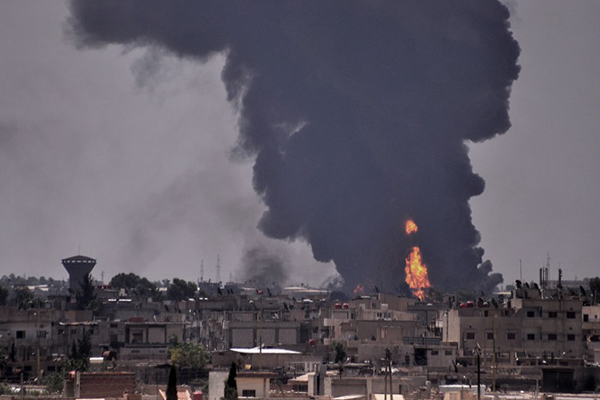
Smoke billows in the Syrian city of Hasakeh on June 28 following a mortar attack by I.S. Delil Souleiman—AFP
U.S.-led coalition has been unable to stem the militant group’s tide.
The Islamic State militant group’s “caliphate” entered its second year on Monday with the jihadists expanding their territory in Syria and Iraq and their global reach by claiming attacks in Tunisia and Kuwait.
The extremist group headed by Abu Bakr al-Baghdadi announced on June 29, 2014, that it was reviving a form of Islamic government known as the “caliphate,” pledging it would “remain and expand.” In the year since, the group has gained more territory in Syria and Iraq despite an attempted fightback supported by a U.S.-led coalition air campaign.
It has also attracted a string of affiliates—in Egypt, Libya, Yemen, Pakistan and elsewhere—and sought to project fear on an international scale. Last week, the group claimed responsibility for the attack in Tunisia in which 38 people, mostly foreign tourists, were killed at a seaside resort. And it said it was behind a suicide bombing on a Shia mosque in Kuwait that killed 26 people. I.S. also appeared to be the inspiration for an attack in France in which a man rammed his van into a gas factory and beheaded his boss. The three events took place on the same day.
“It’s not clear that these actions are centrally planned or coordinated by I.S.,” said Yezid Sayegh, a senior associate at the Carnegie Middle East Center think tank. “That said, we may be seeing the start of a long campaign conducted by I.S. members or sympathizers who have been trained and then sent back home to their countries to take their own initiative in planning and conducting attacks, depending on their abilities, resources, and opportunities.”
Already, I.S. has inspired fear and horror with its rule over territory in Syria and Iraq, where mass killings and brutal executions have become its hallmarks.
The group controls about 50 percent of Syria’s territory, though much of it is uninhabited, and perhaps a third of Iraq. In Syria alone, it has executed more than 3,000 people in the year since announcing its “caliphate,” the Syrian Observatory for Human Rights said on Sunday. Nearly 1,800 of them were civilians, including 74 children, it said.
There are no reliable figures in Iraq, but I.S. is believed to have executed thousands there, including as many as 1,700 mostly Shia recruits at the Speicher military base near Tikrit. Thousands more have died battling I.S. in Syria and Iraq, including Syrian rebels and government forces, Kurdish fighters in both countries, and Iraqi government troops and Shia militias. But few of these forces have had much success against I.S., with the Iraqi Army in particular facing criticism for abandoning territory to I.S. during a mid-2014 push by I.S.
Iraqi government forces have “no clear command structure,” said Zaid al-Ali, author of The Struggle for Iraq’s Future. “Clearly Baghdad should have enough forces at its disposal to control territory, but not all the anti-I.S. forces take their instructions from Baghdad,” he added. “Some operate as they please, some take instructions from elsewhere.”
In Syria meanwhile, only Kurdish forces backed by the U.S.-led coalition have been able to effectively tackle the group, with analysts saying opposition forces and the regime appear to lack the weapons or the resolve to fight the jihadists. Even the anti-I.S. coalition, which is carrying out air strikes in Syria and Iraq and training Iraqi troops on the ground, has had limited success. It has helped ground forces push I.S. from Kobane and Tal Abyad in Syria, and Tikrit and Diyala province in Iraq. But I.S. has continued to score shocking victories, including the recent capture of Syria’s ancient town of Palmyra and the taking of the Iraqi city of Ramadi in mid-May.
“The international mobilization against Daish has been minimal,” said Sayegh, using the Arabic acronym for the group. “But it may be that they cannot do more, because the return of 150,000 U.S. troops to the battlefield is out of the question.” Ultimately, I.S.’s success is as much the result of political problems as it is military shortcomings. I.S. has emerged because of “the failure of Syria and Iraq and the sectarian divisions in them, as well as corruption and decades of authoritarian rule,” said Sayegh.
